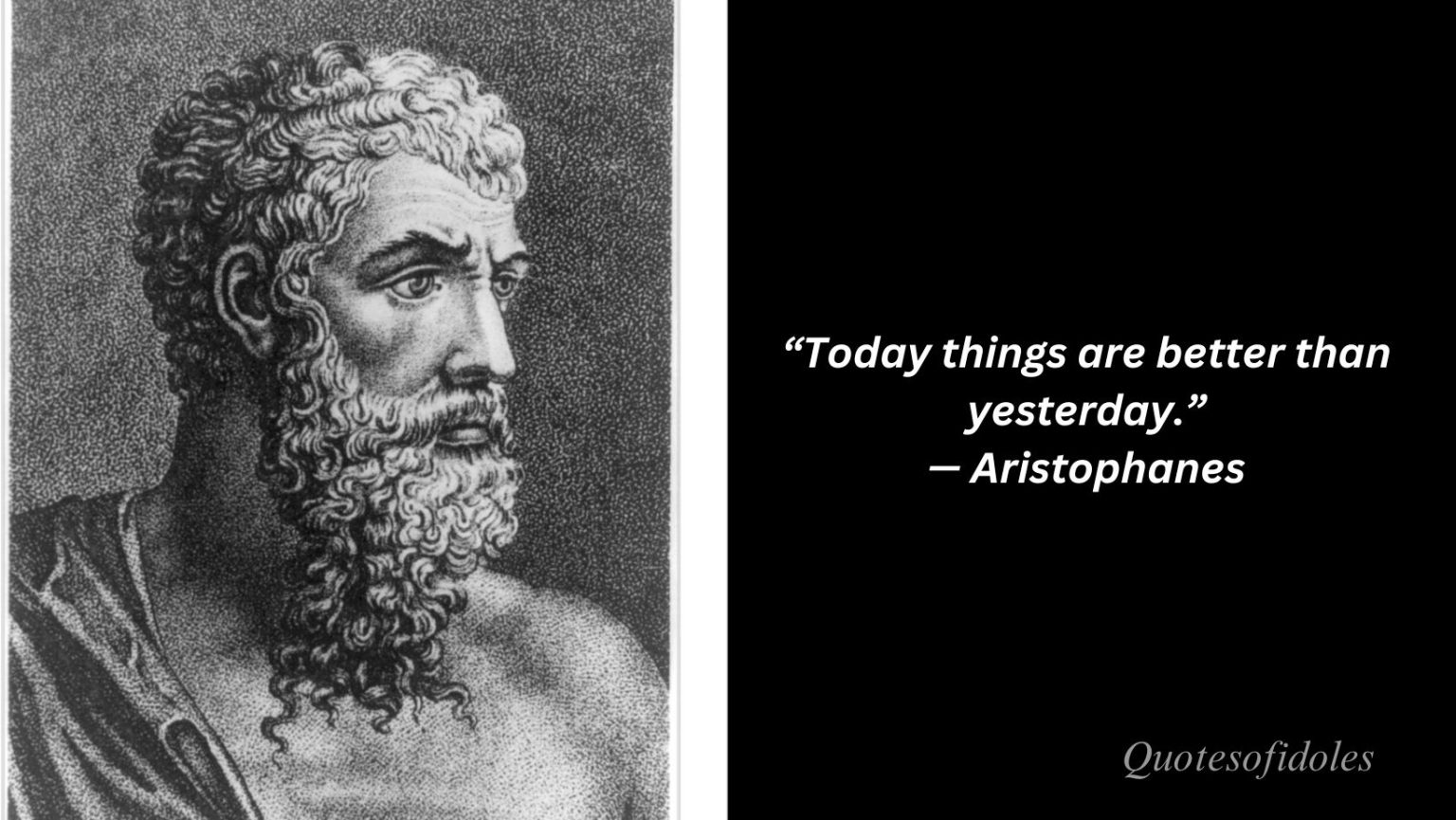Aristophanes (c. 446 – c. 386 BC),son of Philippus and Zenodora, of the deme Kydathenaion (Latin: Cydathenaeum),was a comic playwright or comedy-writer of ancient Athens and a poet of Old Attic Comedy.Eleven of his forty plays survive virtually complete. These provide the most valuable examples of a genre of comic drama known as Old Comedy and are used to define it, along with fragments from dozens of lost plays by Aristophanes and his contemporaries.
Aristophanes Quotes
1. “Open your mind before your mouth.”
— Aristophanes
2. “Today things are better than yesterday.”
— Aristophanes
3. “Ignorance can be cured, but stupidity is forever.”
— Aristophanes
4. “Youth ages, immaturity is outgrown, ignorance can be educated, and drunkenness sobered, but stupid lasts forever.”
— Aristophanes
5. “You cannot teach a crab to walk straight.”
— Aristophanes
6. “High thoughts must have high language.”
— Aristophanes
7. “Words give wings to the mind and make a man soar to heaven.”
— Aristophanes
8. “A demagogue must be neither an educated nor an honest man; he has to be an ignoramus and a rogue.”
— Aristophanes
9. “Old age is second childhood.”
— Aristophanes
10. “Even if you persuade me, you won’t persuade me.”
— Aristophanes
11. “By words the mind is winged.”
— Aristophanes
12. “Comedy is allied to justice.”
— Aristophanes
13. “A fox is subtlety itself.”
— Aristophanes
14. “There is no honest man! not one, that can resist the attraction of gold!”
— Aristophanes
15. “Hunger knows no friend but its feeder.”
— Aristophanes
16. “Ah! the Generals! they are numerous, but not good for much!”
— Aristophanes
17. “Evil events from evil causes spring, And what you suffer flows from what you’ve done.”
— Aristophanes
18. “When men drink, then they are rich and successful and win lawsuits and are happy and help their friends. Quickly, bring me a beaker of wine, so that I may wet my mind and say something clever.”
— Aristophanes
19. “The love of wine is a good man’s failing.”
— Aristophanes
20. “Does it seem that everything is extravagance in the world, or rather madness, when you watch the way things go? A crowd of rogues enjoy blessings they have won by sheer injustice, while more honest folks are miserable and die of hunger.”
— Aristophanes
21. “Poverty, the most fearful monster that ever drew breath.”
— Aristophanes
22. “Thou shouldst not decide until thou hast heard what both have to say.”
— Aristophanes
23. “Open your mouth and shut your eyes and see what Zeus will send you.”
— Aristophanes
24. “Comedy too can sometimes discern what is right. I shall not please, but I shall say what is true.”
— Aristophanes
25. “Love is merely the name for the desire and pursuit of the whole.”
— Aristophanes
26. “Weak mortals, chained to the earth, creatures of clay as frail as the foliage of the woods, you unfortunate race, whose life is but darkness, as unreal as a shadow, the illusion of a dream.”
— Aristophanes
27. “A man may learn wisdom even from a foe.”
— Aristophanes
28. “Children have a master to teach them, grown-ups have the poets.”
— Aristophanes
29. “Mix and knead together all the state business as you do for your sausages. To win the people, always cook them some savory that pleases them.”
— Aristophanes
30. “Times change. The vices of your age are stylish today.”
— Aristophanes
31. “Ye Children of Man! whose life is a span, Protracted with sorrow from day to day, Naked and featherless, feeble and querulous, Sickly, calamitous creatures of clay!”
— Aristophanes
32. “You vote yourselves salaries out of the public funds and care only for your own personal interests; hence the state limps along.”
— Aristophanes
33. “One bush, they say, can never hide two thieves.”
— Aristophanes
34. “How can I study from below, that which is above?”
— Aristophanes
35. “LYSISTRATA May gentle Love and the sweet Cyprian Queen shower seductive charms on our bosoms and all our person. If only we may stir so amorous a feeling among the men that they stand firm as sticks, we shall indeed deserve the name of peace-makers among the Greeks.”
— Aristophanes
36. “There is no beast, no rush of fire, like woman so untamed. She calmly goes her way where even panthers would be shamed.”
— Aristophanes
37. “The man credited with inventing the comma, colon, and full stop punctuation marks was a librarian of Alexandria called Aristophanes.”
— Aristophanes
38. “The wise learn many things from their enemies.”
— Aristophanes
39. “The gods, my dear simple fellow, are a mere expression coined by vulgar superstition. We frown upon such coinage here.”
— Aristophanes
40. “Full of wiles, full of guile, at all times, in all ways, are the children of Men.”
— Aristophanes
41. “But how should women perform so wise and glorious an achievement, we women who dwell in the retirement of the household, clad in diaphanous garments of yellow silk and long flowing gowns, decked out with flowers and shod with dainty little slippers?”
— Aristophanes
42. “If a man owes me money, I never seem to forget. But if I do the owing, I somehow never remember.”
— Aristophanes
43. “Wise people, even though all laws were abolished, would still lead the same life.”
— Aristophanes
44. “A truce to idle phrases!”
— Aristophanes
45. “The trickiest thing is the nature of man, apparent in everything.”
— Aristophanes
46. “Wealth – the most excellent of all gods.”
— Aristophanes
47. “I would treat her like an egg, the shell of which we remove before eating it; I would take off her mask and then kiss her pretty face.”
— Aristophanes
48. “Do not bandy words with your father, nor treat him as a dotard, nor reproach the old man, who has cherished you, with his age.”
— Aristophanes
49. “That is what we do each time we see someone who falls in love with evil strategies, until we hurl him into misery, so he may learn to fear the Gods.”
— Aristophanes
50. “Shall I crack any of those old jokes, master, At which the audience never fail to laugh?”
— Aristophanes
51. “It is the compelling power of great thoughts and ideas to engender phrases of equal size.”
— Aristophanes
52. “When men drink wine they are rich, they are busy, they push lawsuits, they are happy, they are friends.”
— Aristophanes
53. “There’s no art where there’s no fee.”
— Aristophanes
54. “Look at the orators in our republics; as long as they are poor, both state and people can only praise their uprightness; but once they are fattened on the public funds, they conceive a hatred for justice, plan intrigues against the people and attack the democracy.”
— Aristophanes
55. “No man is really honest; none of us is above the influence of gain.”
— Aristophanes
56. “Under every stone lurks a politician.”
— Aristophanes
57. “Woman is adept at getting money for herself and will not easily let herself be deceived; she understands deceit too well herself.”
— Aristophanes
58. “Have you ever, looking up, seen a cloud like to a Centaur, a Part, or a Wolf, or a Bull?”
— Aristophanes
59. “Shakespeare wrote sculduddery because he liked it, and for no other reason; his sensuality is the measure of his vitality.”
— Aristophanes
60. “First listen, my friend, and then you may shriek and bluster.”
— Aristophanes
61. “These impossible women! How they do get around us! The poet was right: can’t live with them, or without them!”
— Aristophanes
62. “The truth is forced upon us, very quickly, by a foe.”
— Aristophanes
63. “LYSISTRATA You know how to work. Play with him, lead him on, Seduce him to the cozening-point – kiss him, kiss him, Then slip your mouth aside just as he’s sure of it, Ungirdle every caress his mouth feels at Save that the oath upon the bowl has locked. MYRRHINE.”
— Aristophanes
64. “One’s country is wherever one does well.”
— Aristophanes
65. “I love him, oh! I love him; but he won’t let himself be loved.”
— Aristophanes
66. “It is bad taste for a poet to be coarse and hairy.”
— Aristophanes
67. “Surely you do not believe in the gods. What’s your argument? Where’s your proof?”
— Aristophanes
68. “Evil events from evil causes spring.”
— Aristophanes
69. “To invoke solely the weaker arguments and yet triumph is an art worth more than a hundred thousand drachmae.”
— Aristophanes
70. “Prayers without wine are perfectly pointless.”
— Aristophanes
71. “I saw a cavalry captain buy vegetable soup on horseback. He carried the whole mess home in his helmet.”
— Aristophanes
72. “A man should be able to stand up under any disaster for his country’s good.”
— Aristophanes
73. “That man is sharp who can say what he wants in a minimum of words.”
— Aristophanes
74. “A slave is but half a man.”
— Aristophanes
75. “Women, you overheated dipsomaniacs, never passing up a chance to wangle a drink, a great boon to bartenders but a bane to us – not to mention our crockery and our woolens!”
— Aristophanes
76. “It is right that the good should be happy, that the wicked and the impious on the other hand, should be miserable; that is a truth, I believe, which no one will gainsay.”
— Aristophanes
77. “Do not take a blind guide.”
— Aristophanes
78. “You can’t have anything else to say: you’ve poured out every drop of what you know.”
— Aristophanes
79. “One must not try to trick misfortune, but resign oneself to it with good grace.”
— Aristophanes
80. “This is what extremely grieves us, that a man who never fought Should contrive our fees to pilfer, on who for his native land Never to this day had oar, or lance, or blister in his hand.”
— Aristophanes
81. “MEN Ah cursed drab, what have you brought this water for? WOMEN What is your fire for then, you smelly corpse? Yourself to burn?”
— Aristophanes
82. “An insult directed at the wicked is not to be censured; on the contrary, the honest man, if he has sense, can only applaud.”
— Aristophanes
83. “It often happens that less depends upon the valor of an army than the skill of the leader.”
— Aristophanes
84. “I must think of something foolproof for a fool.”
— Aristophanes
85. “It should not prejudice my voice that I’m not born a man, if I say something advantageous to the present situation. For I’m taxed too, and as a toll provide men for the nation.”
— Aristophanes
86. “An actor should refine public taste.”
— Aristophanes
87. “LYSISTRATA By the Goddesses, you’ll find that here await you Four companies of most pugnacious women Armed cap-a-pie from the topmost louring curl To the lowest angry dimple. MAGISTRATE.”
— Aristophanes
88. “Have you ever been struck by a sudden desire for – soup?”
— Aristophanes
89. “What unlooked-for things do happen, to be sure, in a long life!”
— Aristophanes
90. “What’s the use of crowbars? It’s not crowbars that we need, it’s intelligence and common sense.”
— Aristophanes
91. “STREPSIADES. So the rear of a gnat is a trumpet. Oh! what a splendid discovery! Thrice happy Socrates! ‘Twould not be difficult to succeed in a law-suit, knowing so much about the gut of a gnat!”
— Aristophanes
92. “Let’s smell like women, armed to teeth with rage!”
— Aristophanes
93. “SOCRATES. Silence, old man, give heed to the prayers… Oh! most mighty king, the boundless air, that keepest the earth suspended in space, thou bright Aether and ye venerable goddesses, the Clouds, who carry in your loins the thunder and the lightning, arise, ye sovereign powers and manifest yourselves in the celestial spheres to the eyes of the sage.”
— Aristophanes
94. “Very soon we’ll be eating lepadotema choselackogaleokrani oleipsanodrimypotrimmatosil phiotyromelitokatake chymenokicklepikossyphopkat toperisteralektryonoptokeph aliokinklopeleiolagoiosiral obaphetragalopter ygdn.”
— Aristophanes
95. “In the second half of the play he arbitrates a contest between the poets Aeschylus and Euripides for pre-eminence in the art of tragedy.”
— Aristophanes
96. “The Chorus of Eleusinian Initiates lead Dionysus and Aeschylus off in a torchlight procession recalling the inspirational finale of Aeschylus’ Oresteia.”
— Aristophanes
97. “In the first half of the play he is the anti-heroic and burlesque figure long familiar in comedy and satyr drama.”
— Aristophanes








